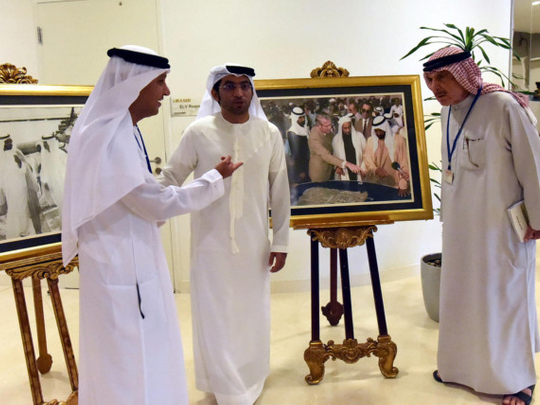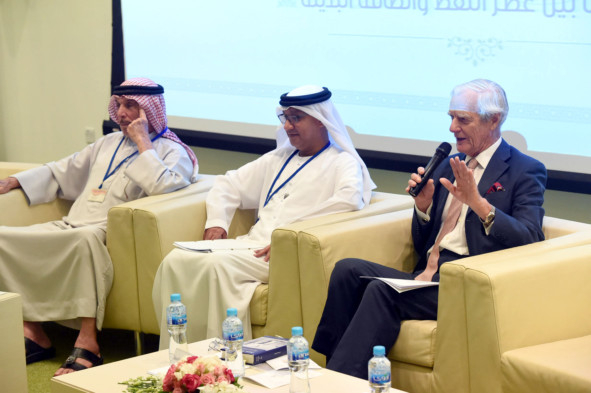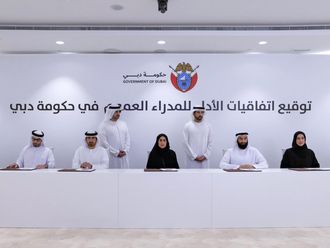
Abu Dhabi: Oil may last for 50 years or 100 years and the UAE does not have to be entirely dependent on fossil fuels and alternative sustainable solutions for the next generation must be found, a symposium was told at Zayed University on Wednesday.
Khalil Ailabouni, a senior Emirati journalist in Abu Dhabi who contributed to the founding of Abu Dhabi Radio station said this while speaking at a symposium on ‘The Historic Abu Dhabi Oil Discovery Anniversary’ at the Zayed University in Abu Dhabi on Wednesday.
For the first time, the oil in Abu Dhabi was discovered in Habshan, Al Gharbia on October 24 in 1960.
It was organised by the Zayed Centre for Studies and Research in collaboration with the university.
“Shaikh Zayed told us that we don’t want our young generations to face similar difficulties we faced in deserts so we have to do something for the future of our youngsters and find renewable energy solutions,” Ailabouni said.
“I was with Shaikh Zayed when he said ‘the people of the UAE have survived for hundreds of years without oil, and are capable, if necessary, of living without it for many more centuries’,” he said.
“I know our economy and national progress depend on oil, but this does not mean oil is everything for us. For the UAE, oil is a means and not an end in itself. The UAE will use oil only in the way she judges it to be compatible with her political, social and progressive programme,” Ailabouni quoted Shaikh Zayed.
A historian, David Heard, who came to Abu Dhabi in 1963 as a petroleum engineer, and remained ever since, said, “I remember in those days there were no roads, harbours or even airports nearby. We landed on the Sabkha, an area of coastal flats, tracks were graded to make roads and a jetty was constructed at Ras Ghanadah, which is located close to the town of Ghantoot, about 90 kilometres northwest of the capital, to accept barges and the landing craft.”
The oil was discovered in Habshan in 1960 but challenges remained the same. Those days, the communications in deserts and rest of the world, was a big challenge, he said.
Masdar which has been contributing towards the renewable energy is praiseworthy and that Abu Dhabi needs to lower its fossil fuel dependency and move towards greener future, Heard said.
Abdullah Al Saleh, Undersecretary of the Ministry of Economy for Foreign Trade and Industry, said, “The United Nations reports confirm that more than half of the world’s population live in civilised areas. This percentage is growing annually and is expected to add about 2.5 billion people to civilised life by 2050. This means that the proportion of the population around the world who live in these areas will reach 65 per cent by 2050, hence the increased energy demands.”
According to reports by the Organisation of Petroleum Exporting Countries (Opec) from the World Oil Outlook, the demand for energy sources is expected to increase by 40 per cent by 2040.
SIDEBAR
Solar energy cheaper than conventional fossil fuels
Renewable and solar energy sources nowadays are not only proving to the world that they are environmentally friendly but they are economically cheaper than conventional resources of power generations.
Speaking to Gulf News on sideline of the symposium at Zayed University, Abdulaziz Al Obaidli, Acting General Manager of Shams Power Company, said, “Of course, the tariff for renewable and solar energies are cheaper than conventional resources of power production. It’s been proved and now the world is looking towards the UAE.”
The UAE has set a new record in the market and proved to the world that renewable energy from solar becomes much cheaper than producing electricity from conventional way — gas, fuel and coal, said Al Obaidli.
“Approximately between $3 and $3.5 for a kilowatt per hour when it comes from conventional power plants by firing gas for example. But today in solar plants of Masdar, its tariff is Dh2.99 [below 3 dollars] for one kilowatt per hour,” he said.
Even Saudi Arabia solar project’s tariff is around $1.8 per kilowatt per hour, Al Obaidli said.
“All these new records for the cost of generation of electricity are proving to the world that solar and renewable energies are not only environmental choice now, even it’s economical choice, too,” he said.
Now the UAE is moving ahead very well to start achieving its sustainable renewable energy goals as Abu Dhabi aims to get its 7 per cent energy from renewable resources by 2020, while Dubai aims to achieve its 75 per cent energy demands from its renewable energy sources by 2050, he said.
“We hope to achieve this target,” he said.













